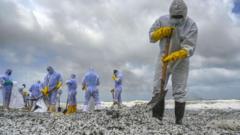In the aftermath of the Vietnam War, thousands continue to suffer from the devastating effects of Agent Orange, the herbicide used by U.S. forces. Among these individuals is Nguyen Thi Ngoc Diem, born with severe physical deformities likely due to her father's exposure to the toxic chemical. For years, she has awaited assistance from the same nation that contributed significantly to her suffering.
In 2022, Nguyen managed to get support through a U.S.A.I.D. initiative that provided her with graphic design training. This program not only honed her skills but also facilitated a job opportunity— a promising lifeline in her struggle. However, the joy was short-lived as her workplace closed, leaving Ms. Diem to rely again on impending aid that would allow her to purchase necessary equipment for her profession.
Recent announcements about major funding cuts by the Trump administration cast doubt on her prospects. U.S.A.I.D. funding aimed at assisting victims like Nguyen has been frozen, and key personnel involved in these humanitarian efforts are to be dismissed. Eyewitness accounts from Dong Nai Province underline the stark reality faced by the victims of Agent Orange, many of whom see the dwindling support as a direct abandonment of U.S. responsibility.
“It makes no sense,” expressed Ms. Diem, echoing the sentiments of countless others waiting for aid. Lives are marked by the ramifications of war, and the memory of parental sacrifice is painfully juxtaposed with the inadequacy of federal support.
As funding cuts deepen the crisis for those affected, the question remains: how does a nation reconcile its past actions? For the Agent Orange victims, immediate, meaningful assistance from the U.S. is more than just aid— it is a step toward healing long overdue. While hope remains fragile, the need for recognition and commitment from the United States has never been greater.






















